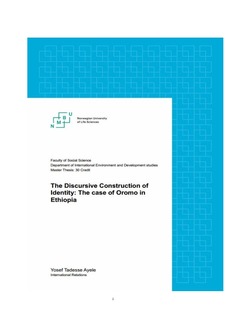| dc.description.abstract | Identity politics in Ethiopia is not a recent phenomenon. It has been one of the major mobilizing factor in the entire modern history. However, the institutionalization and the establishment of the issue in the policy and legal documents of the nation has started in 1991 when the current government: EPRDF, came to power.
The insurgent TPLF went in to the jungle in 1974 to fight, what they perceived ‘Amhara domination’ and to liberate the people of Tigray from such subjugation. In the struggle, by forming a collation with other ethno nationalists from Amhara, Oromo and the other people in the south, formed EPRDF and succeeded to topple Derg from power. Then, for the first time in modern history of the nation a federal form of government established in 1995 FDRE constitution. By this constitution the nation is divided in to nine autonomous regions and two city administrations based on language and ethnic identity. Since then, identity politics and the debate over federalism vis-à-vis the extent of the regions autonomy is in hike.
Recently when the federal government announce a ‘master plan’ to extend the territory of the capital city, Addis Ababa in to Oromia region, a public protest swamped the whole region of Oromia that claimed more than 200 lives. Hence this study is interested to investigate the discursive construction of Oromo identity, by the Oromo elites and to what extent does this discursive constructions letter exhibited in the international media coverage of this Oromo protest.
Accordingly, by analysing the international media texts on the one hand and articles written by the Oromo elites on the other, this study argues that, the international media coverage on the current Oromo protest is relied on the marginalized Oromo discourse of the Oromo elites. Further, this discursive construction of the media texts is deeply embedded on the wider social practice of Ethnic politics and Federalism in Ethiopia. | nb_NO |
